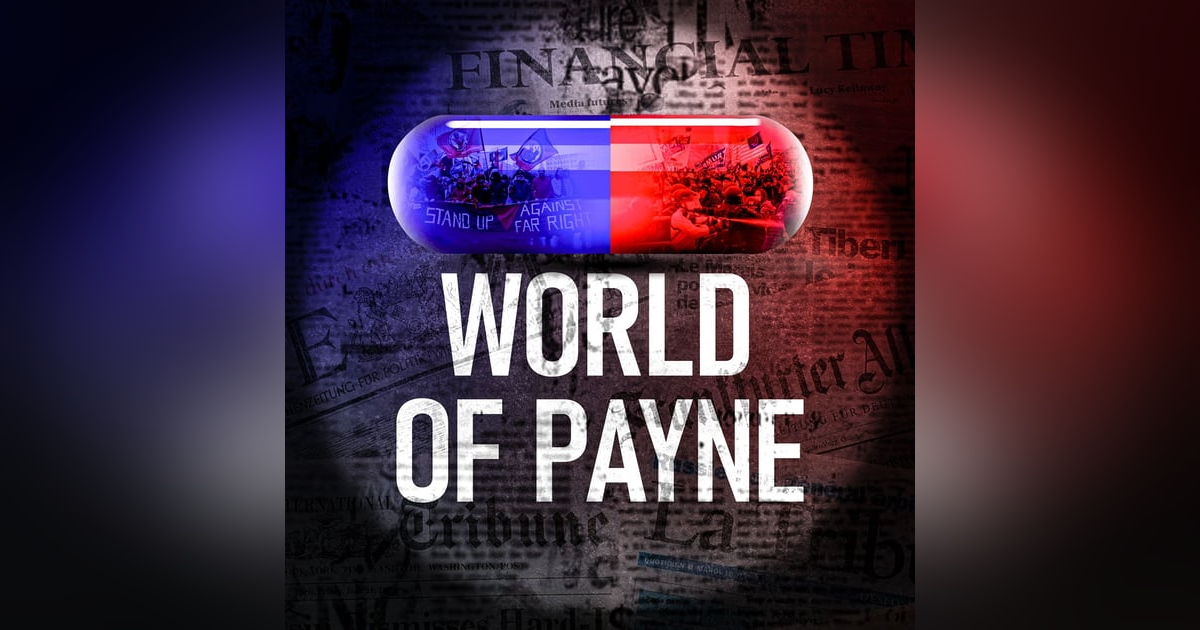Rebuilding on Solid Ground: The Role of Responsibility, Integrity, and Faith in a Shaking World
Welcome to a deeper dive into the principles we discussed in our latest podcast episode, When the Foundations Tremble | World of Payne Podcast. In a world that often feels as though it's constantly shifting beneath our feet, with global events and national issues creating uncertainty, it's more crucial than ever to anchor ourselves in values that stand the test of time. In this blog post, we'll be expanding on the conservative principles of personal responsibility, unwavering integrity, and a foundation of faith, exploring how these values can guide individuals and communities towards rebuilding stronger, more resilient systems. We'll examine recent global events through this lens, offering insights on how we can navigate these challenges with a renewed sense of purpose and accountability.
The Week's Tremors: A Global Overview
The past week, like many before it, has been filled with events that can easily leave one feeling overwhelmed. From geopolitical shifts to technological disruptions and economic anxieties, the sense of instability is palpable. Let's break down some of the key events that have contributed to this feeling.
U.S. - Australia Rare Earths Alliance
The strategic alliance between the United States and Australia concerning rare earth minerals highlights the growing importance of securing supply chains and reducing dependence on single-source providers, particularly China. Rare earth elements are crucial for various technologies, including electric vehicles, renewable energy systems, and defense applications. This alliance signifies a proactive approach to ensuring access to these critical resources, bolstering national security and economic stability.
From a conservative perspective, this alliance aligns with the principles of national sovereignty and economic independence. By diversifying supply chains and investing in domestic or allied sources of critical materials, nations can reduce their vulnerability to geopolitical pressures and maintain control over their economic destiny. This proactive approach to resource management is a responsible step towards safeguarding national interests.
Amazon Web Services Outage
The recent Amazon Web Services (AWS) outage served as a stark reminder of our increasing reliance on digital infrastructure and the potential consequences of its failure. When a major cloud provider experiences disruptions, the ripple effects can be felt across numerous industries, impacting businesses, government services, and everyday consumers. This incident underscores the need for robust cybersecurity measures, redundancy planning, and diversification of technology infrastructure.
This event also highlights the need for personal responsibility in data backup and redundancy. Individuals and businesses can't simply rely on a single cloud provider to secure their data. There must be proactive, diversified security measures taken.
A conservative viewpoint would emphasize the importance of resilient infrastructure and the need for both public and private sectors to invest in robust cybersecurity measures. It also underscores the potential risks of over-reliance on centralized systems and the need for a more decentralized approach to technology infrastructure to mitigate the impact of single points of failure. Furthermore, it reinforces the value of preparedness and contingency planning in a digital age.
Political Scandals
Political scandals, whether involving ethical breaches, financial impropriety, or abuse of power, continue to erode public trust in government institutions. These events not only damage the reputation of individual politicians but also undermine the credibility of the political system as a whole. Restoring faith in government requires transparency, accountability, and a commitment to upholding the highest ethical standards.
From a conservative standpoint, ethical conduct and integrity are paramount in public service. Political scandals betray the public trust and undermine the foundations of a well-functioning democracy. Holding elected officials accountable for their actions and promoting a culture of ethical leadership are essential for restoring confidence in government and preserving the integrity of democratic institutions.
China's Economic Slowdown
China's economic slowdown raises concerns about global economic stability and the potential impact on international trade and investment. As the world's second-largest economy, China's economic performance has far-reaching implications for other nations and industries. Factors such as declining real estate values, regulatory crackdowns, and geopolitical tensions contribute to this slowdown. Prudent economic policies and diversified trade relationships are crucial for mitigating the risks associated with China's economic challenges.
A conservative perspective would advocate for free and fair trade practices, diversified trade relationships, and a cautious approach to economic engagement with countries that do not share our values. Strengthening domestic industries and reducing dependence on foreign economies are seen as essential for promoting economic resilience and national security.
America's Ongoing Government Shutdown
The ongoing government shutdown in the United States highlights the deep political divisions and the challenges of reaching consensus on critical policy issues. Government shutdowns disrupt essential services, impact federal employees, and create uncertainty for businesses and citizens. Finding common ground and prioritizing the needs of the nation are crucial for avoiding these disruptive events.
From a conservative viewpoint, fiscal responsibility and limited government are essential principles. Government shutdowns often result from a failure to agree on spending priorities and a lack of fiscal discipline. Emphasizing the importance of balanced budgets, responsible spending, and compromise are key to avoiding these disruptive events and ensuring the efficient functioning of government.
The Conservative Lens: Responsibility, Integrity, and Faith
Given the tremors we've examined, it's essential to consider how conservative principles can offer a stable foundation for navigating these turbulent times. Responsibility, integrity, and faith are cornerstones of a conservative worldview, providing guidance for individual conduct and collective action.
Personal Responsibility: Taking Ownership
Personal responsibility is the cornerstone of a free and prosperous society. It emphasizes the importance of individuals taking ownership of their actions, decisions, and outcomes. This includes being accountable for one's choices, fulfilling obligations, and contributing to the well-being of one's community. When individuals embrace personal responsibility, they are empowered to shape their own lives and create a better future for themselves and those around them.
In contrast to collectivist ideologies that emphasize the role of the state in providing for individuals, conservatism emphasizes individual agency and self-reliance. This does not mean that conservatives are opposed to helping those in need. Rather, they believe that individuals are best equipped to make decisions about their own lives and that government intervention should be limited to providing a safety net for those who cannot provide for themselves.
In practice, personal responsibility translates into a commitment to hard work, education, and financial prudence. It means taking care of one's family, obeying the law, and contributing to the community through volunteering and civic engagement. It also means being honest with oneself and others, accepting responsibility for one's mistakes, and learning from them.
Unwavering Integrity: The Bedrock of Trust
Integrity is the quality of being honest and having strong moral principles. It is the bedrock of trust in personal relationships, business dealings, and government institutions. When individuals act with integrity, they are true to their word, uphold ethical standards, and treat others with respect. This fosters a climate of trust and cooperation, which is essential for a well-functioning society.
Conservatives value integrity because it is essential for maintaining social order and preserving individual liberty. When individuals are honest and trustworthy, they are more likely to respect the rights of others and to abide by the rule of law. This creates a stable and predictable environment in which individuals can pursue their goals without fear of being cheated or exploited.
In practice, integrity means being honest in one's dealings with others, even when it is difficult or unpopular. It means standing up for what is right, even when it is risky or costly. It also means admitting one's mistakes and taking responsibility for one's actions.
Foundation of Faith: A Source of Strength
Faith, whether religious or spiritual, provides a source of meaning, purpose, and moral guidance for many individuals. It offers a framework for understanding the world, coping with adversity, and finding hope in times of uncertainty. A foundation of faith can strengthen individuals' resolve, inspire acts of compassion, and promote a sense of community.
Conservatives often view faith as an essential component of a healthy society. They believe that religious institutions play a vital role in promoting moral values, providing social services, and fostering a sense of community. They also believe that faith can provide individuals with a sense of purpose and meaning that transcends the material world.
In practice, a foundation of faith can manifest in various ways, such as attending religious services, praying or meditating, volunteering in religious organizations, or simply living according to one's moral beliefs. It can also involve engaging in acts of charity and service to others, inspired by one's faith.
Rebuilding on Solid Ground: A Call to Action
With these principles in mind, how can we actively rebuild on solid ground in the face of these challenges? It begins with a conscious shift in our mindset and a commitment to taking concrete steps.
Awareness vs. Outrage: Choosing a Constructive Path
In today's hyper-connected world, it's easy to get caught up in a cycle of outrage and negativity. Social media algorithms often prioritize sensational content, leading to a constant stream of alarming news and divisive rhetoric. While it's important to be aware of the challenges facing our society, dwelling on outrage can be counterproductive and emotionally draining.
Instead of succumbing to outrage, we can choose a more constructive path by focusing on awareness and action. This means staying informed about the issues that matter to us, but also taking the time to reflect on the root causes of these problems and identify potential solutions. It also means engaging in respectful dialogue with others, even when we disagree with them, and working together to find common ground.
Furthermore, choosing awareness over outrage involves cultivating a sense of gratitude and focusing on the positive aspects of our lives. This can help us maintain a sense of perspective and avoid becoming overwhelmed by negativity. It also means taking care of our mental and physical health, so that we can be more resilient and effective in addressing the challenges we face.
Conclusion: Rebuilding with Strength and Accountability
As we've explored in this blog post, and as discussed in our podcast episode, When the Foundations Tremble | World of Payne Podcast, the world presents us with constant challenges. But by embracing personal responsibility, unwavering integrity, and a foundation of faith, we can navigate these turbulent times with confidence and build a stronger, more resilient future. This requires a commitment to self-improvement, ethical conduct, and active engagement in our communities. It also requires a willingness to learn from our mistakes, adapt to changing circumstances, and work together towards a common goal.
Ultimately, rebuilding on solid ground is not just about addressing specific issues or implementing certain policies. It's about cultivating a culture of responsibility, integrity, and faith that permeates all aspects of our lives. It's about creating a society where individuals are empowered to take ownership of their lives, act with honesty and compassion, and contribute to the well-being of others. By embracing these values, we can create a world that is more just, more prosperous, and more sustainable for generations to come.



